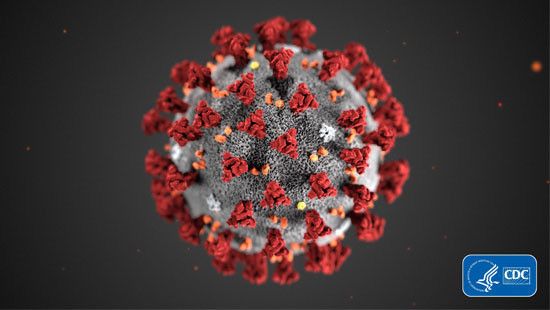
Coronavirus (COVID-19)
Novel Coronavirus (COVID-19)
What is Coronavirus (COVID-19)?
Coronaviruses are RNA enveloped viruses than can infect animals and humans. So far, there are six known human coronaviruses. Four of these coronaviruses are less pathogenic, generally causing only minor respiratory symptoms like the common cold. Two other coronaviruses — Severe Acute Respiratory Syndrome Coronavirus (SARS CoV) and Middle East Respiratory Syndrome Coronavirus (MERS CoV) — can cause serious respiratory diseases.
A new strain of Coronavirus (COVID-19) has emerged, is causing illnesses globally and is different from other coronaviruses. To date, the virus has infected tens of thousands of people around the world, with thousands of reported deaths. As surveillance proceeds, there may be more cases identified. The cases were originally linked to a live animal market in Wuhan City, in the Hubei Province of China, but now cases are occurring due to community spread. Public Health authorities are actively investigating this outbreak.
Because of this, public health recommendations focus on standard infection control practices to reduce exposure to and transmission of a range of illnesses.
What are the symptoms?
Symptoms of COVID-19 are like other upper-respiratory infections, including fever, cough and difficulty breathing. They range from mild to severe and appear 2-14 days after exposure.
How is it transmitted?
Since coronaviruses can be extremely contagious and spread easily from person to person, medical diagnosis is required.
Transmission routes for COVID-19, include:
- The air by coughing and sneezing
- Close, personal contact, such as touching or shaking hands
- Touching surfaces or objects contaminated with virus particles, then touching your mouth, nose or eyes before washing your hands
How is it controlled?
There are currently no vaccines available to protect you against human coronavirus infection.
Infection risk can be reduced by doing the following:
- Wash your hands often and correctly. The World Health Organization recommends performing hand hygiene with soap and water or alcohol based hand rub if soap and water are not available. Washing your hands often with soap and water is one of the best ways to avoid transmission of emerging pathogens.
- Avoid touching your eyes, nose or mouth with unwashed hands
- Avoid close contact with people who are sick
- In regions where excessive cases are being reported, avoid areas where live animals are being sold or raised
- If you have fever or other symptoms after traveling home, you should wear a mask and immediately call a doctor. Be sure to let the doctor know where you were traveling.
- Clean and disinfect hard surfaces and high touch areas using products appropriate for coronavirus and approved by public health authorities.
Enveloped viruses are the least resistant to inactivation by disinfection. The structure of these viruses includes a lipid envelope, which is easily compromised by most disinfectants. Once the lipid envelope is damaged, the integrity of the virus is compromised, thereby neutralizing its infectivity.
As with any communicable disease, it is recommended to focus on proper hand hygiene and disinfection of high-touchpoint areas including railings, doorknobs and handles and restroom surfaces.
References and Further Information
_


